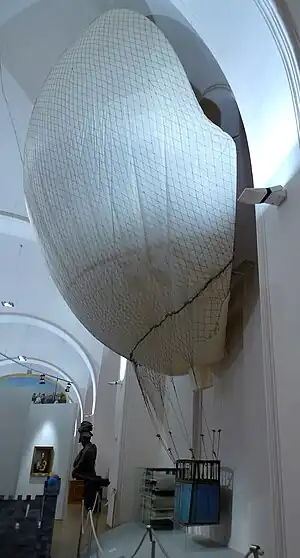| L'Intrépide | |
|---|---|
 | |
| L'Intrépide on display at the Heeresgeschichtliches Museum. | |
| Type | Hydrogen balloon |
| Owners and operators | Compagnie d'Aérostiers |
| In service | 1795 - 1796 |
| Last flight | September 1796 |
| Fate | Captured by Austrian forces |
| Preserved at | On display at the Heeresgeschichtliches Museum in Vienna |
.jpg.webp)
L'Intrépide ("The Intrepid") was a hydrogen balloon of the Compagnie d'Aérostiers (French Aerostatic Corps) and is the oldest preserved manned aircraft in Europe.[1]
L'Intrépide was the larger[2] of two observation balloons, the other being Hercule ("Hercules"), issued to the Aerostatic Corps in June 1795, twelve years after the pioneering hydrogen balloon flights of Professor Jacques Charles and the Robert brothers in Paris. These balloons were used by the Corps's first company attached to General Jourdan's Army of Sambre-et-Meuse in 1796. When that army was defeated by Austrian forces at the Battle of Würzburg on 3 September 1796, the balloon was captured and taken to Vienna, where it is now on display at the Heeresgeschichtliches Museum.
The balloon's silk envelope is roughly spherical and has a diameter of 9.8 metres (32 ft). Its wooden gondola is very small, measuring 1.14 metres (45 in) by 0.75 metres (30 in) and its railing has a height of 1.05 metres (41 in).[2] The balloon envelope is a replica, with the original displayed folded in a glass case nearby.[1]
References
- 1 2 Information plaque displayed in the Heeresgeschichtliches Museum: "Da es sich hierbei um das älteste noch bekannte Luftfahrzeug Europas handelte, mußte nicht zuletzt aus Rücksicht auf konservatorische Bedingungen die originale Ballonhülle entsprechend gesondert untergebracht werden."
- 1 2 Duhem, Jules (1964). Histoire de l’arme aérienne avant le moteur. Paris: Nouvelles Éditions latines. p. 429.